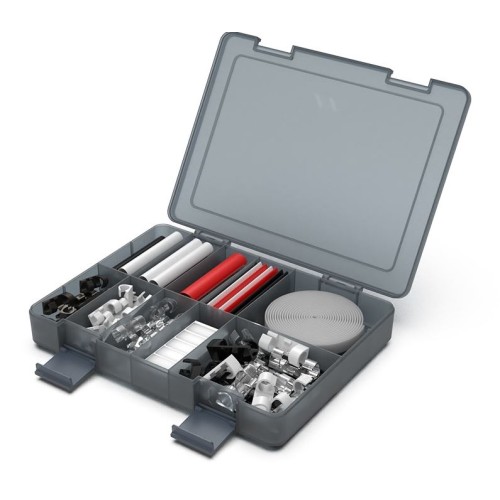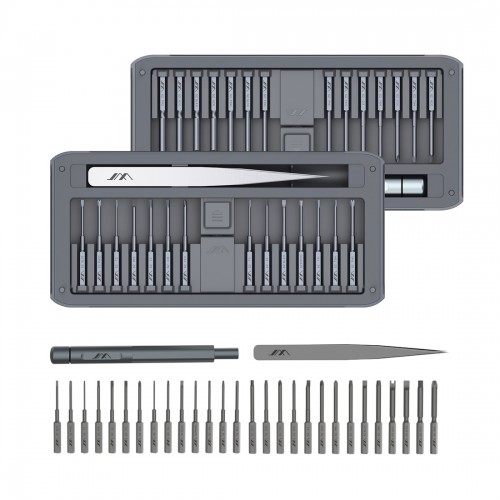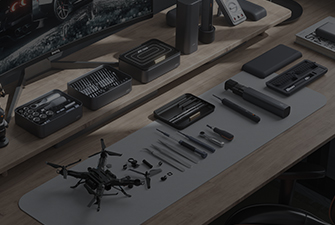
A well-stocked toolbox is a craftsman's essential resource for fundamental tasks like measuring wood to driving screws with precision. This resource gives insight to opt for correct tools and apply them successfully.
- Start by putting together a basic kit of necessary hand tools such as hammers, drivers, wrenches, pliers, saws, and tapes.
- Get acquainted with each tool's purpose and its particular applications.
- Develop techniques through active projects, gradually making tasks more complex.
Remember that perfecting hand tool use boosts your craft skills. With thorough expertise, tools will enhance your capacity to deliver precise, demanding project outcomes.
Power Up Your Projects: Exploring Power Tools
Prepared to supercharge projects? Explore robust power tools blending precision with speed. These core power tools can radically improve results for both pros and amateurs. From performance drills to precision saws, power tools give multiple capabilities to support construction work.
- Unleash the potential of cordless impact drivers for effortless fastening and demolition.
- Utilize reciprocating saws for efficient, clean cuts across diverse materials.
- Improve woodworking outcomes via strong planers and jointers providing fine finishes.
Implement power tools to reduce build time and boost quality of results.
Perfect Measurements Demystified
When fine detail matters, selecting proper measuring instruments changes outcomes dramatically. From basic rulers to advanced laser levels, indispensable instruments help realize designs with exact precision. Whether adept artisan or fresh hobbyist, measurement mastery opens additional creative opportunities.
- Investigate the wide selection of measuring devices catering to varied needs.
- Grasp the distinct uses and merits of each measurement instrument.
- Strengthen skills for measurement accuracy and correct application.
Sets for All Needs
For professionals and DIYers alike, the proper toolset is crucial to complete projects. From simple tightening to complex assembly, the correct tool collection secures efficiency and precision. To find the ideal match for your needs, consider the type of tasks you'll be performing most frequently.
Should you opt for an extensive set or a more targeted kit? Once you know what you need, survey options to compare features, build quality and price. Read feedback from other buyers online to collect practical advice prior to choosing.
By investigating and planning, pick the perfect toolkit to handle jobs with certainty.
Tool Upkeep: Keep Your Hand Tools Performing
Ensuring hand tools are cared for is important for woodworkers and hobbyists. Avoid neglect—unmaintained tools produce dull blades, defects and poor experiences. Periodic maintenance retains tools in excellent shape and secures longevity. After use, wipe and remove grime from tools to maintain condition. Store them in a dry place to prevent rust and corrosion.
- Maintain blade sharpness with periodic stone or file sharpening sessions.
- Use recommended oil on moving parts to cut friction and prevent wear.
- Inspect handles for cracks or damage and replace them as needed.

Adhering to these maintenance practices will lengthen the lifespan of tools and enhance your workflow.
Crucial Hand Tools for a Personal Workshop
A stocked home workshop offers a great space for hobbyists and DIY practitioners. Specialist tools add value but foundational hand tools are critical for diverse projects. A must-have selection includes a reliable hammer, a versatile adjustable wrench, and a sturdy tape measure for accurate measurements. Ensure you carry assorted screwdrivers, pliers for twisting and a utility blade for cutting substances. A reliable saw enables accurate cuts while a level maintains straight, even results.
- Workshop Basics: Essential Hand Tools

Demystifying Power Tool Safety: A Comprehensive Guide
Power tools constitute robust equipment delivering significant power and productivity. However these devices necessitate comprehensive knowledge of protective protocols. Avoiding safety precautions can result in critical injuries. This manual clarifies safety practices for power tools and equips you to operate safely.
Start with getting to know your tools: study manuals closely and grasp unique safety features. Continually use appropriate protective equipment including glasses, ear defenders and gloves. Keep tools maintained consistently to ensure they function correctly.
Safety should always be the leading consideration in any work area. Complying with these precautions ensures you can use power tools safely and with confidence.
Selecting the Right Measuring Tools for Accuracy
If accuracy is the aim, the measurement instruments you pick are highly influential. Multiple types of measuring devices are offered, each built for distinct tasks. Understanding distinctions between tools is central to informed choosing. Take into account accuracy, resolution and measurement type when choosing proper tools.
- To measure lengths precisely, use a ruler or tape measure commonly.
- To determine angles correctly, rely on a protractor.
- Calipers—especially digital—are perfect for measuring small features.
Careful choice of appropriate tools secures precise and dependable results.
Selecting The Ultimate Tool Collection

Starting the process of selecting a toolkit can feel thrilling yet overwhelming. As options multiply, feeling overwhelmed is understandable. This wide-ranging guide offers advice to pick the perfect tool set for your needs.
Initially, consider the nature of projects you expect to undertake. Are you a seasoned professional or a beginner? Clearly defining your goals will help narrow down your choices.
- Blend both tool types where appropriate to maximize productivity and precision Blend both tool types where appropriate to maximize productivity and precision Use both hand and power tools together when suitable for optimal, Power Tools efficient results
- Give precedence to core necessary tools
- A dependable hammer and optional mallet or sledgehammer
- A versatile set of screwdrivers, wrenches and pliers is important
- Tape and ruler for measurement tasks
- Level, plumb bob or transit for alignment
Consider tool build materials, your budget and the maker's reputation. Recall that durable toolsets offer long-run value.
Simple DIY: Making Tool Usage a Breeze
Beginning your initial DIY project can appear overwhelming. Still, armed with the right tools and knowledge, tough projects become manageable. Begin by studying and understanding your tools. Examine manuals closely and rehearse core operations safely. Never forget safety is the foremost priority. Wear protective safety guard gear like goggles, gloves, and earplugs to shield protect defend yourself from potential hazards.
For tool purchases, quality and robustness should guide decisions. Opt for established brands that deliver durable, long-lasting tools.
Turn to professionals or veteran DIYers at hardware stores for helpful advice. They provide useful tips and insights on selecting the most suitable tools for projects.
- Ensure tools are sharp—a sharp tool improves safety and performance.
- Organize your tools for easy access and longevity.
- Expand your skills and knowledge through DIY
When to Use Power Tools Versus Hand Tools
For workshop projects, the decision between power and hand tools can be perplexing. While heavy-duty power tools bring speed and capability, hand tools stay essential for precision and small tasks. Here's a breakdown guide to help you select choose pick the right option tool equipment for the job.
- When work demands finesse—carving, assembling or delicate repairs—hand tools are preferred. Hand tools commonly offer better control and are more economical options.
- When projects require fast cutting, drilling or sanding, power tools markedly reduce time and effort. They can substantially cut down required time and effort.
In the end, tool selection hinges on the specific task, your skill set and available budget. Employ a blend of power and manual tools to reach productive and precise outcomes.
